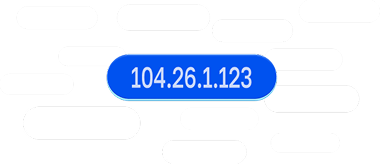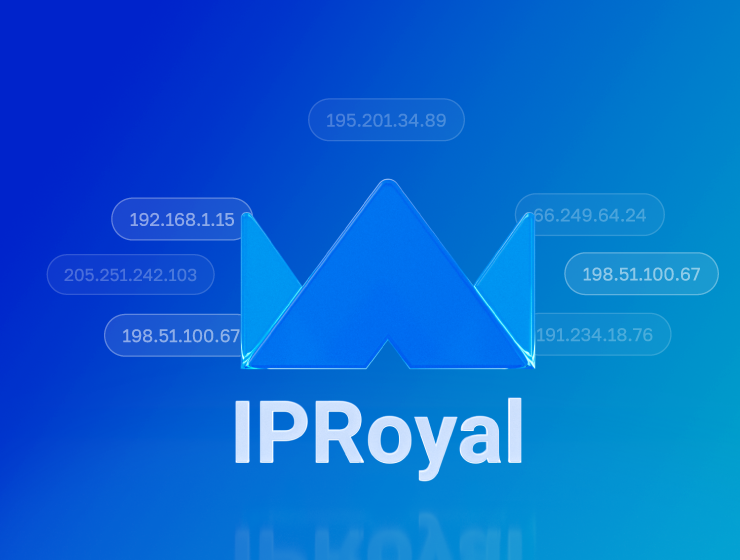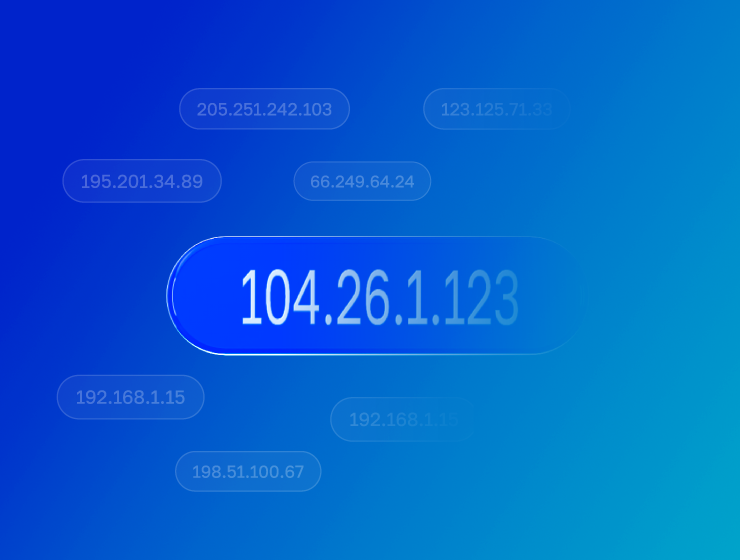You've probably faced a situation where you need to scrape data from a website, but after a few requests, access gets blocked. Or you needed to check how your online store looks to customers from another country. That's exactly what rotating proxies were designed for — technology that changes the game in working with web resources.
Contents
- What an Anonymous Proxy Service Represents
- How an Anonymous Proxy Works
- Proxy Anonymity Levels
- Types of Anonymous Proxies
- Main Benefits of Using Anonymous Proxies
- Risks and Limitations
- How to Set Up and Use an Anonymous Proxy
- Solving the "Anonymous Proxy Detected" Error
- How to Choose a Reliable Anonymous Proxy Service
- FAQ
- Conclusion
- VPN and Proxy: Key Differences
- What is a Proxy Server?
- What is VPN?
- Security and Privacy
- Speed and Performance
- When Should You Use a Proxy Server?
- When Should You Use VPN?
- Is It Worth Using VPN and Proxy Together?
- Mistakes When Choosing Between VPN and Proxy
- Busting Myths About VPN and Proxy
- VPN or Proxy: How to Choose the Right Option?
- FAQ
- Conclusion
- What is a proxy server for Google Chrome and why do you need it
- How proxy works in Chrome browser
- Ways to configure proxy in Google Chrome
- Setting up proxy in Google Chrome through Windows
- Setting up proxy in Google Chrome through macOS
- Setting up proxy for Chrome through extensions
- Setting up proxy in Chrome on Android
- Setting up proxy in Chrome on iPhone and iPad
- Connection check and speed test
- Typical errors when working with proxy in Chrome
- FAQ
- Conclusion
- Why you need proxies for Reddit
- Why Reddit might be blocked
- What restrictions does Reddit have
- Who needs proxies and how they help
- What you can do with proxies for Reddit
- How to choose the right type of proxy for Reddit
- Proxy vs VPN for Reddit
- How to set up and use proxies for Reddit
- Top proxy providers for Reddit in 2025
- Common problems and solutions
- Practical use case scenarios
- FAQ
- Conclusion
- Why LinkedIn requires using proxies
- How proxies help in working with LinkedIn tools
- Types of proxies for LinkedIn and selection criteria
- 10 best proxy providers for LinkedIn
- Setting up and using proxies
- Tips for safe LinkedIn outreach scaling
- FAQ
- Conclusion: how to build a stable system for working with LinkedIn through proxies
- How Amazon detects and blocks proxies
- Benefits of using proxies for Amazon
- Which proxy types work best for Amazon
- Best residential proxy providers for Amazon (2025)
- Key features of a good Amazon proxy provider
- How to set up a proxy for Amazon
- Common problems when working with proxies on Amazon
- How to use Amazon proxies for different tasks
- Best practices for safe Amazon proxy usage
- FAQ
- Conclusion – choose stability, not quantity
- Step 1 — Download and Install VMLogin
- Step 2 — Create a New Browser Profile
- Step 3 — Get Your Gonzo Proxy Credentials
- Step 4 — Configure Proxy Settings in VMLogin
- Step 5 — Verify Proxy Connection
- Step 6 — Launch Your Browser Profile
- Step 7 — Optional: Set Up Multiple Profiles / Rotating Sessions
- Step 8 — Troubleshooting Common Issues
- Step 9 — Start Automating with Gonzo Proxy + VMLogin
- What is an anonymizer in simple terms
- How anonymizers differ from proxies and VPNs
- How an anonymizer works
- Types of anonymizers and anonymity levels
- How to format proxies for working with anonymizers
- How to use an anonymizer to access blocked sites
- Advantages and risks of using anonymizers
- How to choose an anonymizer or proxy for your tasks
- FAQ
- Conclusion
- How to sell quickly and effectively on Avito
- What is mass posting on Avito and why you need it
- Manual and automated mass posting
- Multi-accounting: how to manage multiple accounts on Avito
- Step-by-step launch plan
- How not to get banned with mass posting and multi-accounting
- Mass posting vs alternative sales methods
- FAQ
- Conclusion
- Why TikTok gets blocked and doesn't always work with VPN
- How proxies and VPN differ for TikTok
- When it's better to choose VPN for TikTok
- When it's better to choose proxy for TikTok
- How to set up proxy for TikTok (short instruction)
- Risks and precautions when working with TikTok through VPN and proxies
- FAQ
- Conclusion
- What does transparent proxy mean
- How transparent proxy works in a real network
- Spheres of application for "invisible" proxy
- Advantages and disadvantages of transparent proxy
- Setting up transparent proxy: step by step
- Are transparent proxies secure
- Popular solutions for transparent proxy setup
- Checklist for working with transparent proxies
- FAQ
- Conclusion
- Why proxies are a must for Dolphin Anty
- Types of proxies you can connect to Dolphin
- Rotating vs Static
- Step-by-Step: How to Add a Proxy in Dolphin Anty
- Common proxy connection errors and fixes
- How to choose reliable proxies for Dolphin Anty
- Tips for optimizing costs
- Practical cases of using Dolphin Anty with proxies
- FAQ
- Final thoughts
- Types of proxies used for parsing
- How to choose proxies for parsing
- Setting up and rotating proxies for parsing
- Technical tricks for bypassing blocks
- Practice: building a proxy pool for parsing
- Metrics and monitoring parsing quality
- Best practices and ready solutions
- FAQ
- Summary: Which proxy to choose for parsing
- How proxies work in traffic arbitrage
- Types of proxies for arbitrage and their features
- What problems do proxies solve in arbitrage
- Top proxy providers for arbitrage in 2025
- Comparison table of proxy providers
- How to pick the right proxies for arbitrage
- How to set up proxies for arbitrage
- Safe proxy usage tips
- FAQ
- Conclusion
- What are residential proxies needed for?
- How do residential proxies work?
- How do residential proxies differ from others?
- Connecting residential proxies from GonzoProxy
- Examples of using GonzoProxy residential proxies in Python
- Pros and cons of residential proxies
- How to check residential proxies
- Common usage errors
- FAQ
- Conclusion
- Why does Facebook often block accounts and cards?
- Why use a virtual card for Facebook Ads?
- Multicards.io — a trusted virtual card service for Meta Ads
- Should you buy or create Facebook ad accounts?
- Why proxies are essential
- What kind of proxies are best for Facebook Ads?
- GonzoProxy — premium residential proxies for Facebook Ads
- How to safely link a virtual card to Facebook Ads
- Final recommendations
- What’s a DePIN farm and why should you care?
- So, what exactly is DePIN?
- Other DePIN projects already killing it
- What do you need to start your DePIN farm?
- How to create profiles and set up the antidetect browser
- How to choose and set up a proxy?
- What about Twitter/X accounts?
- How to get email accounts?
- Before you launch — one last tip!
- How to properly chain your accounts?
- How modern fraud detection systems track violators
- Google Ads: anti-fraud specifics in 2025
- How to tell your proxies aren't working?
- Why most proxies no longer work with ad platforms
- How to select and verify proxies for ad platforms
- Strategy for stable operation with ad platforms
- Conclusion: don't skimp on infrastructure
Imagine entering the internet as a new user every single time. That's exactly how rotating proxies work. Instead of one permanent IP address, you get an entire pool of addresses that replace each other according to a set algorithm.
How is this different from regular static proxies? When using a static server, you work through the same IP for the entire session. If a site blocks that address — you'll have to find a new one. With rotation, this problem doesn't exist: blocking one IP doesn't affect your work, the system automatically switches to the next one.
Rotation mechanisms work differently:
Time intervals. You set a period — say, every 10 minutes. When time's up, the system automatically assigns a new address. Convenient when you need a stable session for sequential actions.
Change per request. Send an HTTP request — get a new IP. The next request goes from a different address. Maximum anonymity is achieved exactly this way.
Switch on errors. Smart rotation only triggers on problems: if the server returns error 403, 429, or other blocking signs. An economical option for working with friendly resources.
Dynamic proxies let you process thousands of requests without risking blacklisting. The website thinks hundreds of different users are working with it, when it's actually your single script or program. More details about proxy server mechanisms are covered in "How Proxy Servers Work and Provider Selection Criteria".
Choosing a car? You look at tasks: a compact works for the city, an SUV for off-road. It's a similar story with rotating proxies. Let's break down which type works best for what.
Datacenter Rotating Proxies
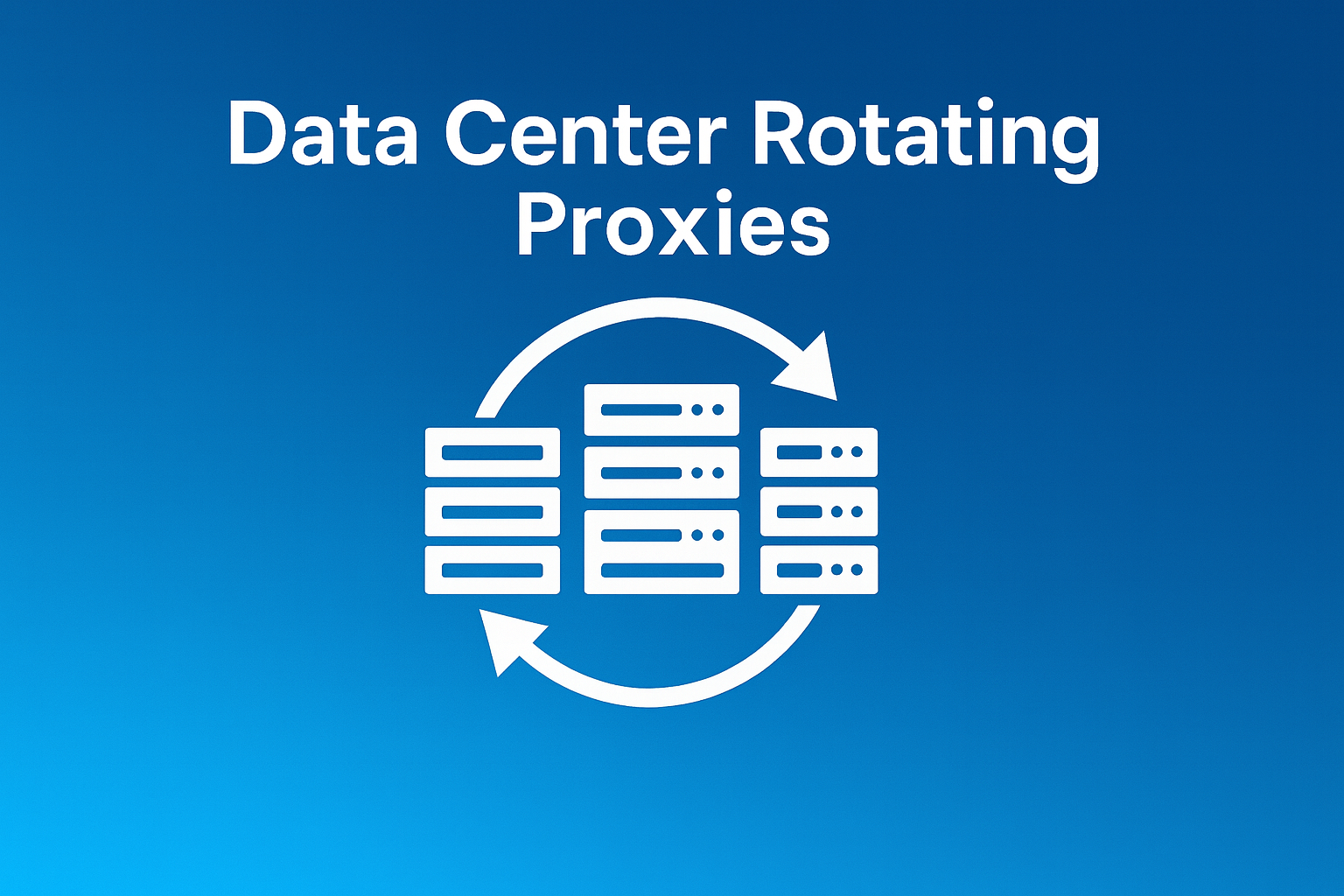
Server farms in data centers work around the clock, providing lightning-fast connection speeds. When you need to quickly process gigabytes of information, datacenter solutions handle it better than others.
What you get:
- Ping under 50ms to most resources
- Channel from 100 Mbps to 10 Gbps
- Thousands of IPs from dozens of countries
- Bills that won't break the budget
There's a catch: major platforms like Amazon or Facebook can detect datacenter addresses. For working with them, better choose another type.
Rotating Residential Proxies
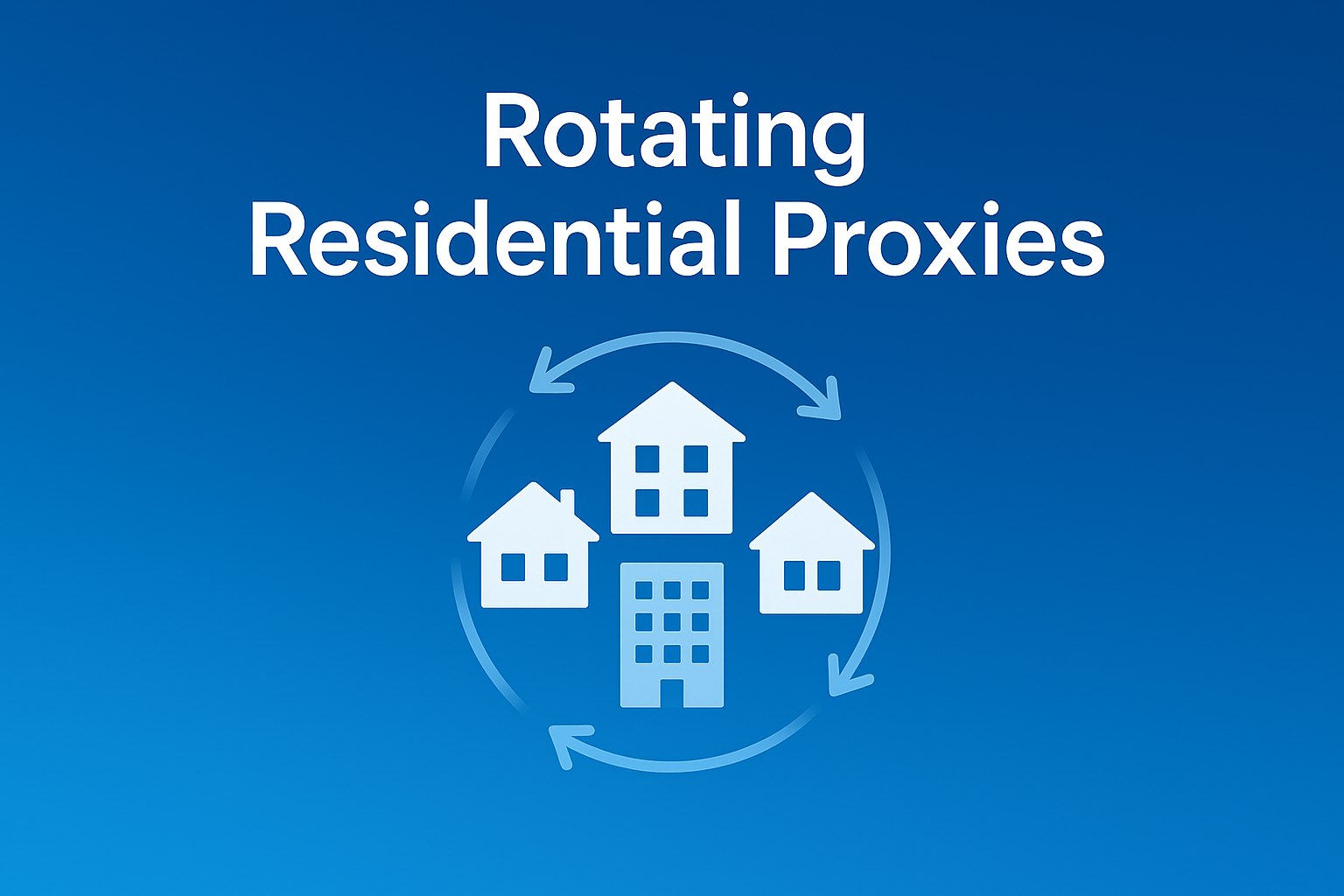
These IPs belong to regular internet providers. The site sees you as an ordinary user sitting at home on their computer. Rotating residential proxies are practically impossible to distinguish from real visitors.
Why people choose them:
- Blocks happen extremely rarely
- Geo-restricted content becomes accessible
- Instagram, Facebook, LinkedIn work without suspicion
- Complex anti-bot systems let requests through
Rotating residential proxies work according to pre-configured parameters. In GonzoProxy, you set the rotation interval — from 30 seconds to 7 minutes or every request from a new IP, and the system automatically changes IP addresses according to your chosen setting. This approach ensures stable operation without needing additional configuration. You can check residential proxy rates right now.
Mobile Proxies with Rotation
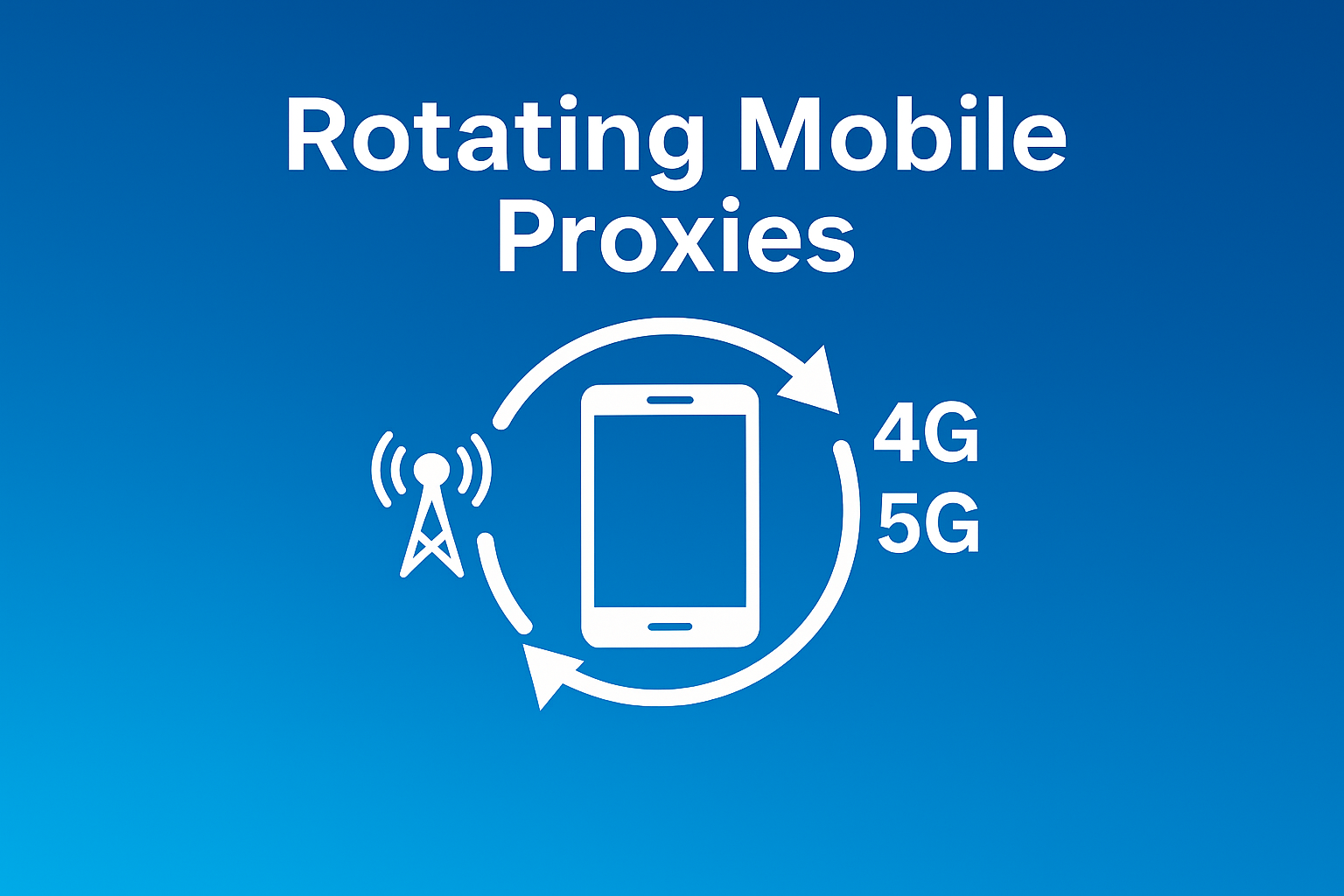
Cellular carrier IP addresses are the gold standard of trust. Hundreds of subscribers hide behind one such address, so nobody dares block them. If you need a hundred percent access guarantee — choose mobile proxies with rotation.
When they're irreplaceable:
- Managing dozens of Instagram or TikTok accounts
- Working with mobile versions of websites
- Testing apps under different carriers
- Parsing data from platforms like Rutube
In GonzoProxy, managing mobile proxies with rotation happens through your personal dashboard. When you need to change the IP address, just click the corresponding button in the control panel. The process takes seconds, and you get a new mobile IP to continue working. The setup simplicity is convenient even for beginners.
Buying rotating proxies, you'll encounter dozens of technical parameters. Which ones really matter? Let's dig into the details that affect work efficiency.
IPv4 and IPv6 proxies with rotation
Two protocols — two different address universes. IPv4 has existed since 1981, every site understands it without exception. IPv4 rotating proxies are a time-tested choice for any task.
IPv6 rotating proxies open doors to the future. There are more addresses in this protocol than grains of sand on all Earth's beaches. Literally. The advantages are obvious:
- Fresh addresses without blocking history
- Price per IP often several times lower
- Preparation for the internet's transition to new protocol
- Uniqueness of each address
Proxies with rotation per request
Sent a request — got data from IP number one. Sent the next — already from IP number two. And so on infinitely. Proxies with rotation per request make you invisible to protection systems.
Where it's critical:
- Collecting competitors' price lists
- Monitoring product availability in stores
- Checking positions in Yandex and Google from different cities
- Automated web service testing
Proxies with unlimited traffic
Counting megabytes in 2025? Forget about it with unlimited plans. Rotating proxies with unlimited traffic let you focus on tasks, not on saving.
Who unlimited plans suit:
- Downloading large files or databases
- Parsing sites with images and videos
- Working with streaming data
- Don't want to think about limitations
There are dozens of application areas, but you'll surely find yours among the most popular. Fortune 500 companies and solo freelancers use rotating proxies to solve business tasks.
Industrial-scale data mining. Stores track competitors' prices. Analysts collect product reviews. HR agencies parse resumes. Without IP rotation, such volumes are impossible to process.
SEO promotion and analytics. Checking what position your site has in Novosibirsk? And in Vladivostok? Dynamic proxies show the real search results picture in any city. Plus competitor monitoring, link tracking, ad analysis.
Multi-accounting without risk. Managing 50 stores on a marketplace? Managing clients' ad accounts? Each account gets its own IP address. Platforms won't suspect connections between profiles.
Software development and testing. Emulating load from thousands of users? Checking how the site works for visitors from Brazil? Testing system resilience to DDoS? Rotating proxies handle it.
Access to blocked content. Studying foreign markets? Watching what ads are shown in other countries? Researching local trends? Geographic boundaries no longer exist.
Privacy and anonymity. Journalistic investigations, confidential research, personal data protection. Constant IP changes leave no digital footprints.
Automating routine. Uploading products to platforms, collecting potential client contacts, monitoring brand mentions. Robots work 24/7 thanks to address rotation.
Looking at ready solutions for your task is a great opportunity to understand how other companies apply the technology. Real cases show possibilities better than any theory.
Theory without practice is dead. You've learned about types and capabilities, now it's time to figure out setup. GonzoProxy's interface is intuitive, but a few tips will save you time at the start.
Step-by-Step setup: browsers, programs
Browser setup takes 2 minutes:
1. Get proxies in GonzoProxy
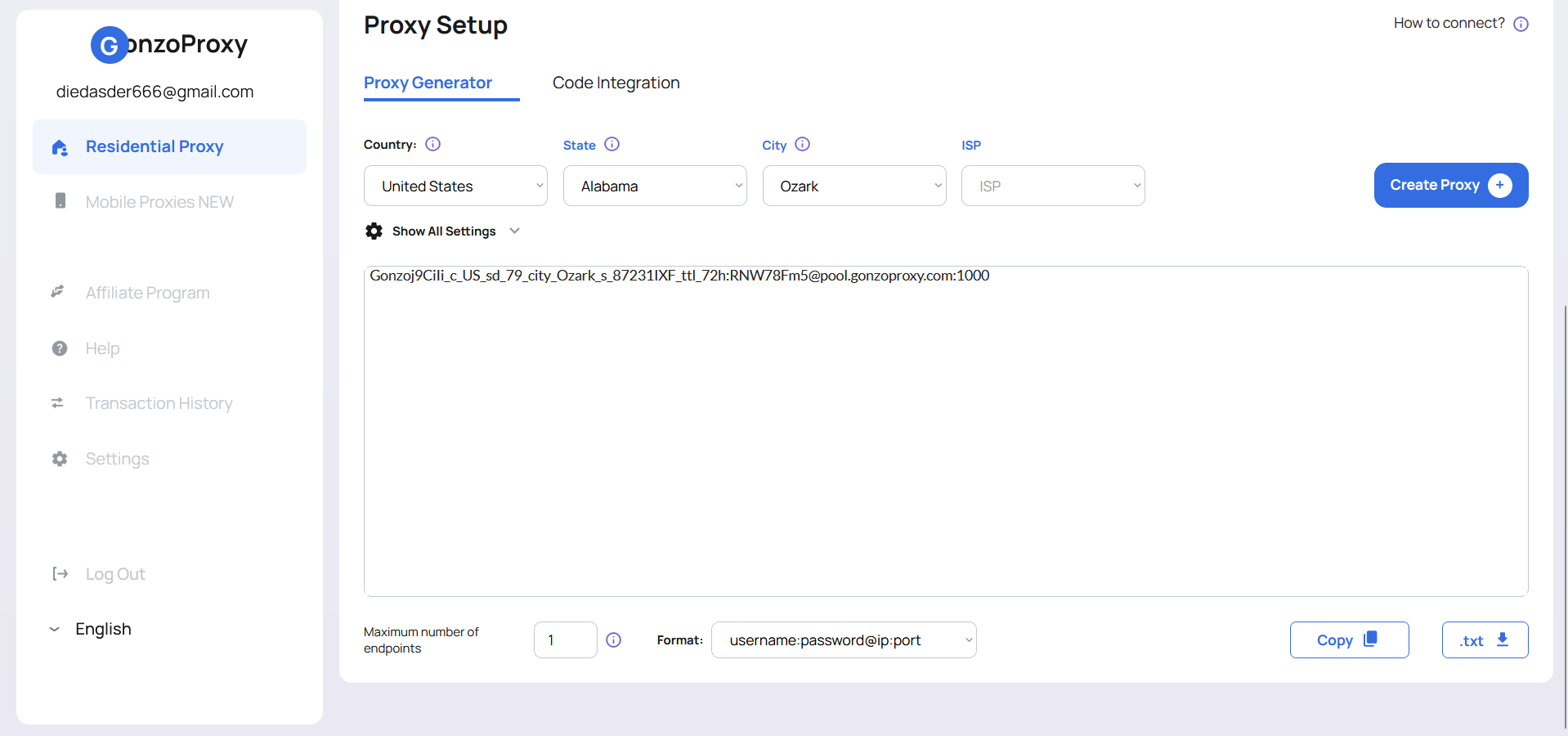
2. Open browser network settings
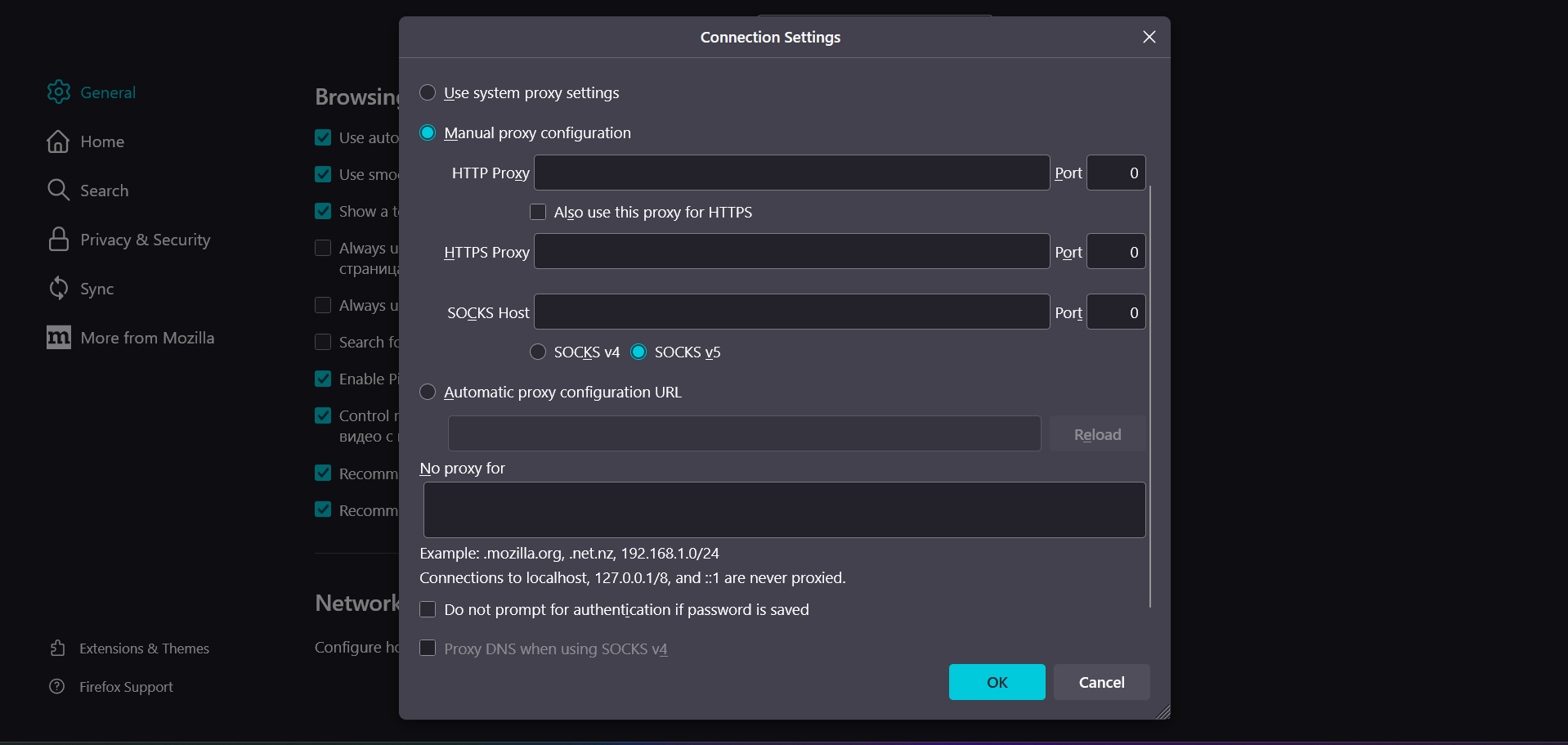
3. Enter the received proxies Gonzoj9CiIi_c_US_sd_79_city_Ozark_s_87231IXF_ttl_72h:RNW78Fm5@pool.gonzoproxy.com:1000, where:
- IP - pool.gonzoproxy.com
- Port - 1000
- Login - Gonzoj9CiIi_c_US_sd_79_city_Ozark_s_87231IXF_ttl_72h
- Password - RNW78Fm5
4. Click OK, done. Now your browser works through proxies
5. Check IP on whoer.net
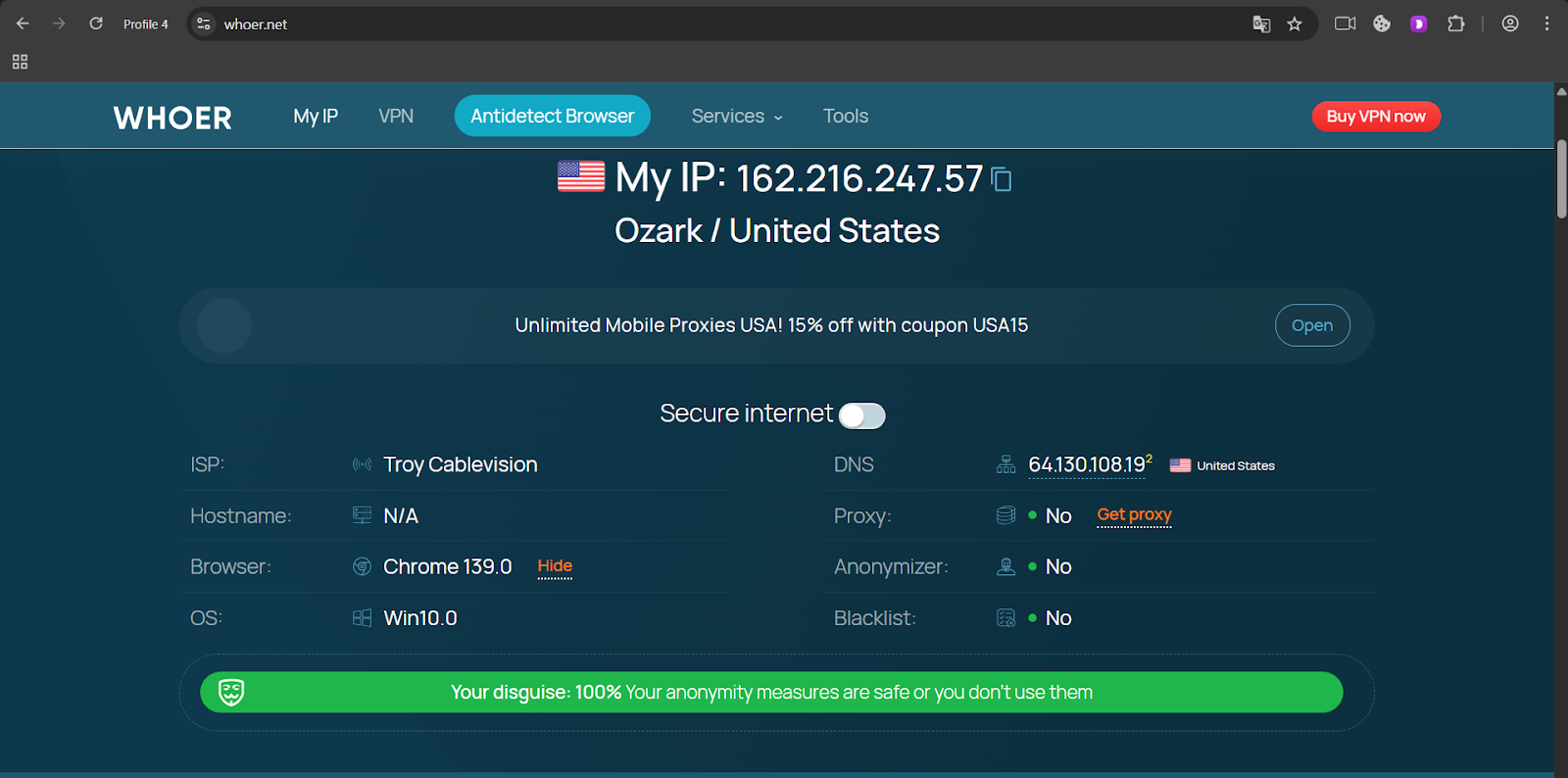
For programs and scripts, the process is similar:
- Python: use requests library with proxies parameter
- Parsers: specify proxies in settings (Screaming Frog, Netpeak Spider)
- Antidetect browsers:
1. Create proxies in GonzoProxy

2. Create a new profile or edit existing
3. In "Proxy" section choose "Custom" or "Manual Setup"
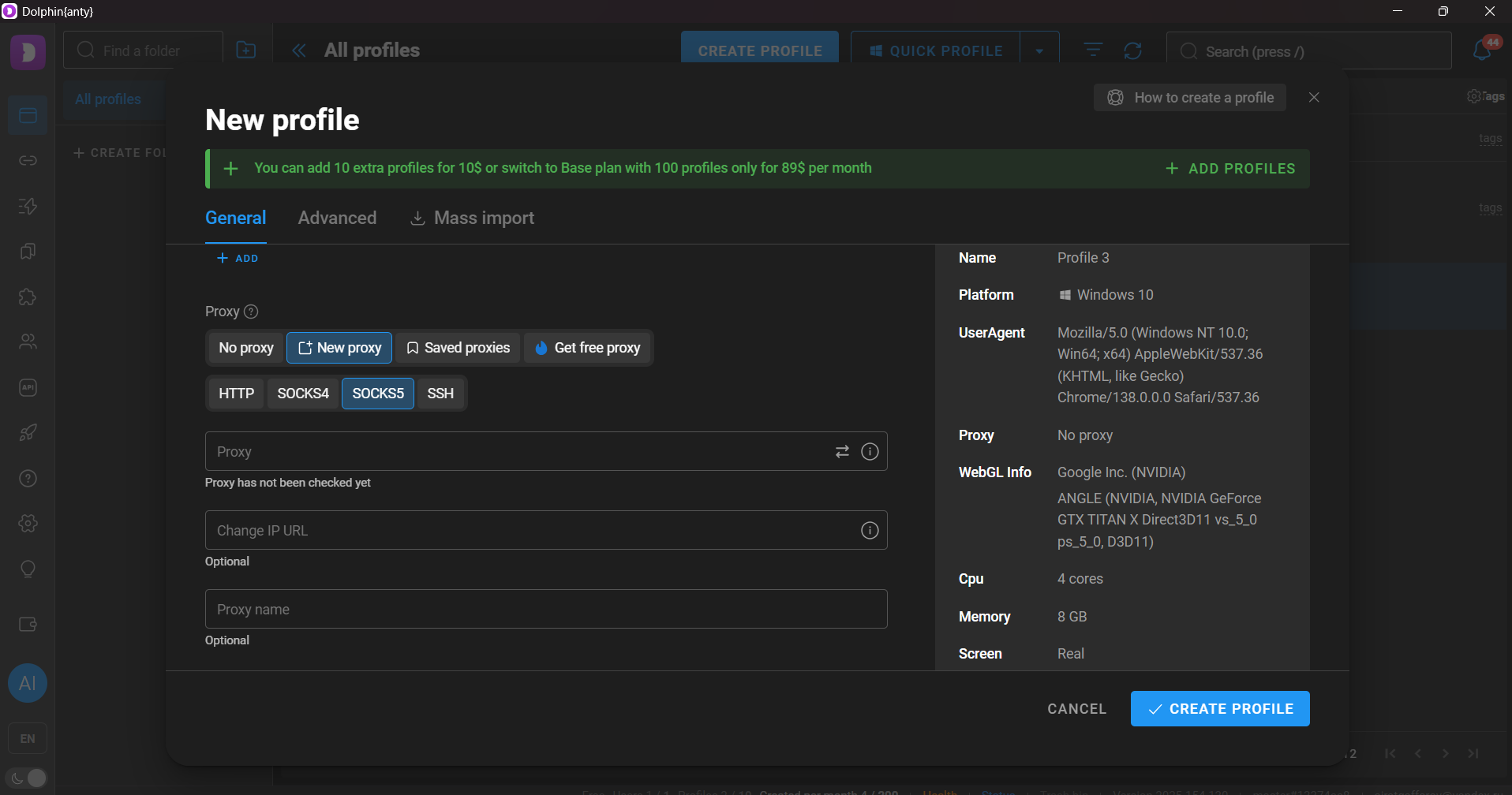
4. Specify HTTP/SOCKS5 type, enter previously obtained proxies
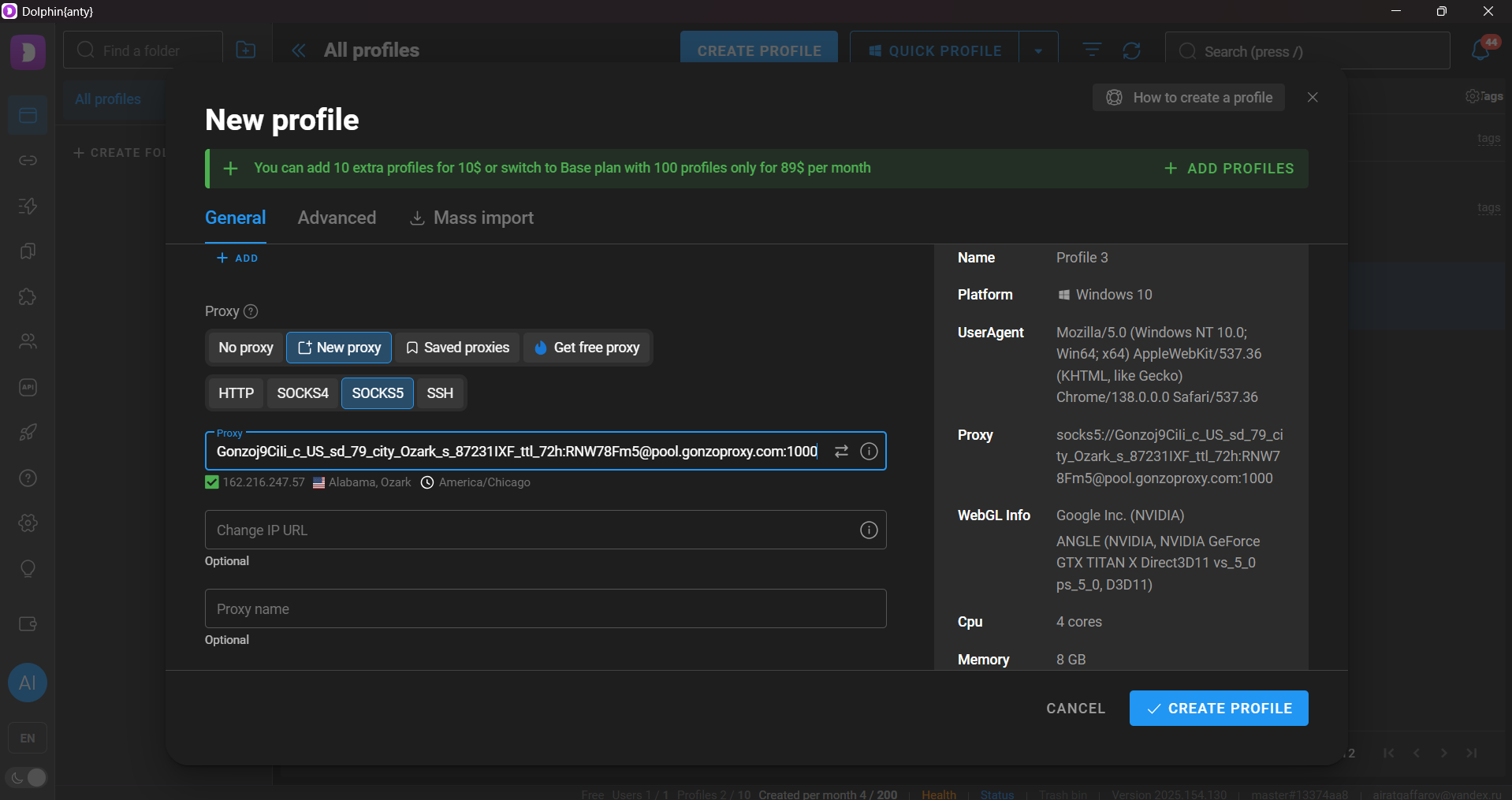
5. Test connection and save profile
Working with proxies in code:
proxies = {
'http': 'http://login:password@proxy.server:port',
'https': 'http://login:password@proxy.server:port'
}Replace data with yours from the dashboard. For rotation in residential proxies, set interval from 30 seconds to 7 minutes. Mobile ones you change manually through the button in control panel.
Checking operation and rotation stability
Trust but verify. Before launching important tasks, test proxies on these services:
Basic IP and geolocation check:
- whoer.net — shows IP, country, provider
- ipleak.net — checks DNS and WebRTC leaks
- ipinfo.io — detailed address information
Speed and ping test:
- speedtest.net — measures download/upload speed
- ping.pe — checks accessibility from different world points
Rotation check:
1. Open whoer.net and remember the IP
2. Wait for set rotation interval (or change manually for mobile)
3. Refresh page — IP should change
4. Repeat 5-10 times to ensure stability
If IP doesn't change or errors appear — contact support. GonzoProxy responds quickly and helps with setup.
What to pay attention to when choosing a provider
Here's a checklist for evaluating a rotating proxy provider:
Additional perks:
- Convenient dashboard for management
- IP whitelists for authorization
- Real-time usage statistics
- Integration with popular tools
FAQ
Rotating proxies are the Swiss Army knife of web technologies. But like any tool, they don't suit everyone and not always.
Who definitely needs proxies with rotation:
- Companies collecting large data volumes
- Marketers with dozens of ad accounts
- Developers testing geo-dependent functionality
- Market and competitor researchers
- Anyone facing IP blocks
Who should think twice:
- VPN is enough for simple anonymous surfing
- If working with one or two sites — static proxies suffice
- With limited budget, start with datacenter solutions
Choosing type for specific task:
- Speed matters most? Get datacenter
- Working with social networks? Only residential or mobile
- Need maximum anonymity? Mobile proxies with rotation
- Large data volumes without limits? Mobile proxies with unlimited traffic
Modern providers like GonzoProxy carefully select IP addresses and have already approached 20 million real user IP addresses. Such a pool guarantees you'll always find a working address for any task. Learn more about the technologies that ensure stable service operation.
Start small: use promo code START15 for 15% off your first order, try different proxy types, find optimal rotation settings. When you understand what works for your specific tasks — scale up. Remember: properly configured rotating proxies save weeks of work and thousands of dollars on developing your own solutions.





